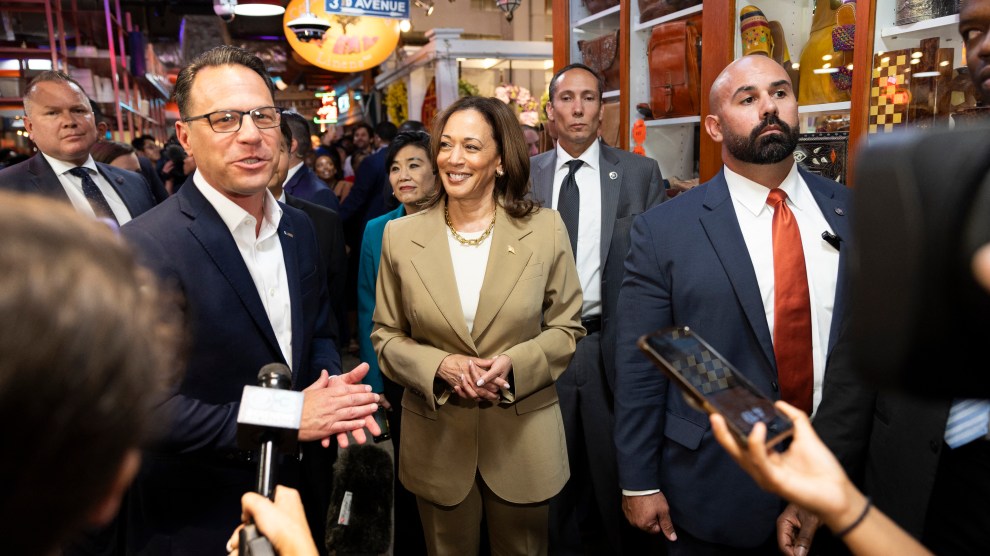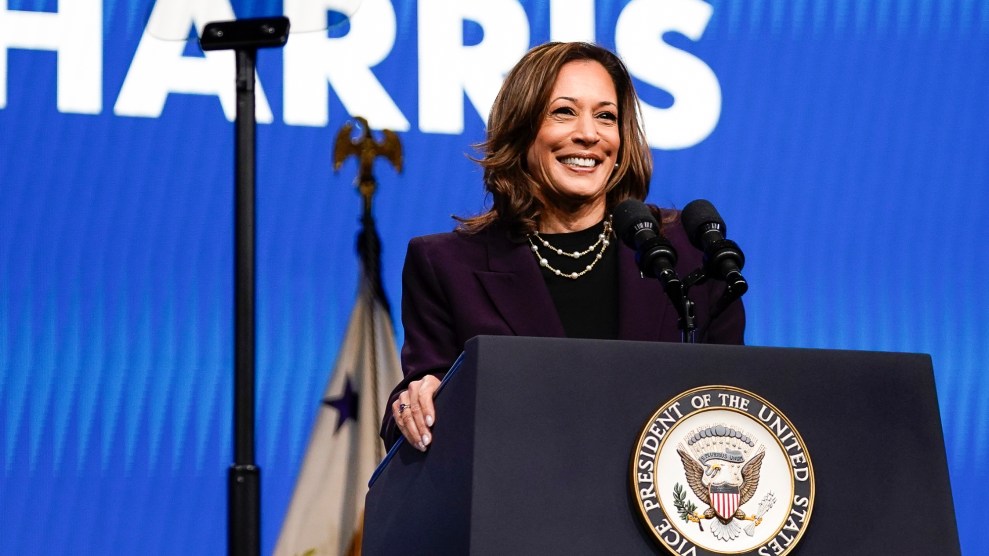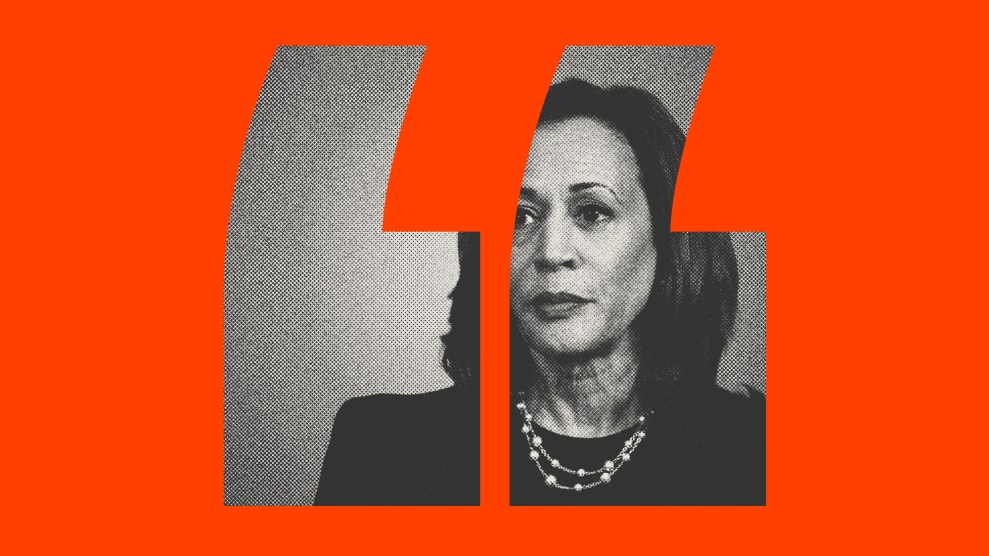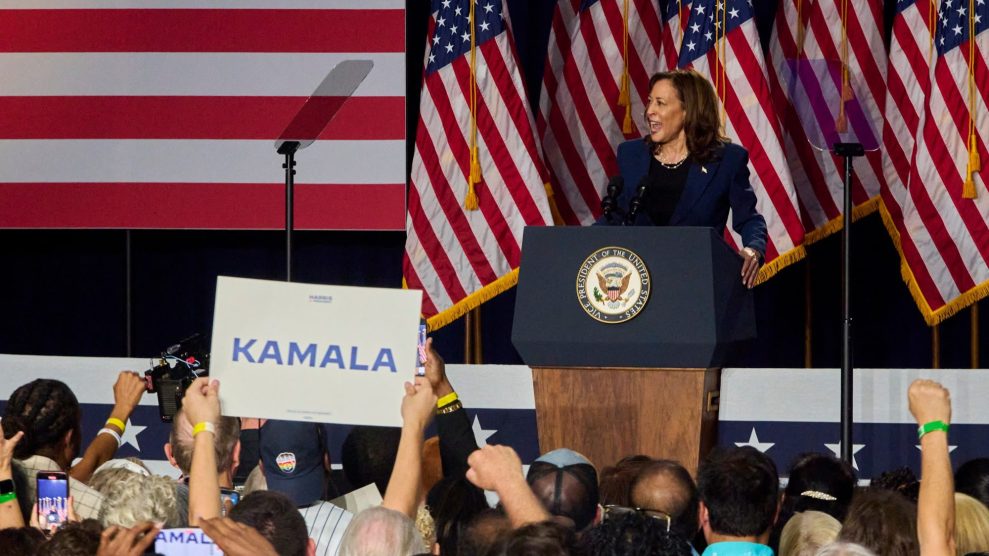
Vice President Kamala Harris and Pennsylvania Governor Josh Shapiro (L) speak to the press at Reading Terminal Market in Philadelphia, Pennsylvania, July 13, 2024.Ryan Collerd/AP/Getty
In the days since Kamala Harris stepped into the role of the Democratic party’s presumptive presidential nominee, the names of several white men, some of whom hold public office in key swing states, have been floated as possibilities for the vice presidential slot. One top contender, many outlets have reported, is someone who was also a prosecutor: Pennsylvania Gov. Josh Shapiro. A moderate Democrat, Shapiro has earned his reputation for being politically ambitious through a swift ascent from the Pennsylvania statehouse, where he was a representative from 2005 to 2011, to the governor’s mansion.
Much of Shapiro’s political record, however, was built while he was Pennsylvania’s attorney general from 2017 to 2023, before leaving to assume the governorship. Harris was California’s attorney general before she entered the US Senate in 2017, and Shapiro noted their shared background when he endorsed her for president: “I’ve known Kamala Harris for nearly two decades—we’ve both been prosecutors, we’ve both stood up for the rule of law, we’ve both fought for the people and delivered results.”
During the 2019 presidential primary, Harris’ prosecutorial record was a liability, despite her efforts to highlight her support for reforms. Her attempt to retroactively claim the title of “progressive prosecutor” was rebuked from within the movement. This time around, Harris seems more eager to lean into a law-and-order reading of her history, particularly in contrast to Donald Trump’s recent felony convictions.
If Shapiro is tapped for vice president, Democrats would run a double-prosecutor ticket in a party where criminal justice reform is increasingly gaining traction. Progressive prosecutors—promising to reform the bail system and provide more police accountability—have won elections in cities across the country. But some experts say that such platforms could falter in battleground states like Pennsylvania. Rebecca Goldstein, a professor at the University of California, Berkeley law school told Mother Jones in a statement, “Although Democratic primary voters and delegates may be wary of those with prosecutorial experience, such experience is likely helpful nationally for distancing Harris (and any former prosecutor she might choose as VP) from left wing criminal justice policy positions that are nationally unpopular.”
Having been elected to statewide office in Pennsylvania three times, Shapiro is good at framing his criminal justice record as he sees fit. As a gubernatorial candidate, Shapiro took the perhaps strategically vague stance of “common sense” criminal justice reform. During his campaign, Shapiro touted his creation, as attorney general, of a statewide police misconduct database. But he also ran as a self-described “pro-police crime fighter” and won endorsements from law enforcement unions.
Robert Saleem Holbrook, the executive director of the Philadelphia-based Abolitionist Law Center, described Shapiro as a “shrewd political operator.” While Shapiro “defaults to the center,” he could be convinced to take some reform positions. “If you can show him that a shift is beneficial to his political ambitions, he will make it,” Holbrook said.
“If you can show him that a shift is beneficial to his political ambitions, he will make it.”
As attorney general, Shapiro sat on the Pennsylvania Board of Pardons, which hears commutation cases, mostly from people serving life sentences. A unanimous vote from the five-member board—which included then-Lt. Gov. John Fetterman—was required to grant clemency. An analysis from the Pennsylvania Capital-Star found that, in 2019, Shapiro cast the fewest votes in favor of commutation.
At the time, Shapiro told the Capital-Star that his record showed that he believed in “second chances,” and that he had supported hundreds of pardon applications, which expunge old, often nonviolent criminal convictions.
Brandon Flood, who served as the board’s secretary—a non-voting position—during Shapiro’s tenure, said that Shapiro was “more cautious” than other board members when it came to commutation cases. “I wouldn’t say he wasn’t considering the merits of the case,” Flood said. “He was also considering the political implications—particularly that someone may potentially re-offend.”
Later in his term, Shapiro supported more commutation cases—perhaps as the result of a different political calculation. The Philadelphia Inquirer reported that Fetterman, frustrated with how few commutations the board granted, said he would run against Shapiro in the 2022 Democratic primary for governor unless more cases were approved. (Shapiro’s spokesperson denied that such a conversation occurred.)
Shapiro was ultimately unopposed in the Democratic primary for governor and, with the support of key progressive groups, handily defeated his Trump-endorsed but poorly-funded opponent, the election-denier Doug Mastriano. According to Holbrook, the Abolitionist Law Center’s director, progressives were able to leverage their base to get Shapiro to support more reforms. Shapiro made campaign promises to create more pathways for geriatric parole and continue Pennsylvania’s moratorium on the death penalty—a reversal of his previous stance. “He knew that he needed this progressive constellation that we were a part of to win,” Holbrook said.
Nikil Saval, the progressive state senator who represents Philadelphia, had a more generous reading. Seemingly in response to Shapiro’s vice-presidential prospects, Saval wrote on X, “[Shapiro] has shown a strong willingness to build coalitions with people that he also disagrees with, and to change his views and policies through that act of coalition-building.”
To some, Shapiro’s political agility would be an asset should Harris select him as her running mate. Mustafa Rashed, a political consultant, said that Shapiro’s record shows his ability to “get things done in Pennsylvania.” Though Biden won the state in 2020, the number of registered Republicans in Pennsylvania has since increased as the number of registered Democrats has decreased. A recent poll found that about half the voters in this crucial battleground state think crime is a major issue. The poll—conducted before Biden announced he would not seek reelection—also showed that 51 percent of Pennsylvania voters thought that Trump would do a better job on crime, while 42 percent thought Biden would.
Shapiro recently side-stepped a question about whether he is being vetted for the vice presidential slot. CBS reported that Shapiro said, “That’s a question to be directed to the Harris campaign.” Meanwhile, on Saturday, he is set to appear with Harris at a campaign event in Carlisle, Pennsylvania.












